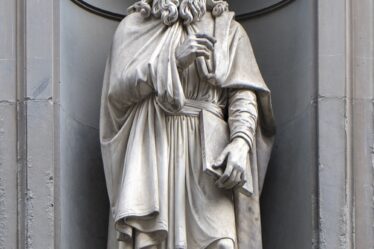

A Rebel Among Stars and Saints
Cecco d’Ascoli’s Dangerous Knowledge is the story of a man who dared to think differently in a world dominated by dogma. In the heart of medieval darkness, while most of Europe knelt before saints and relics, Cecco raised his eyes to the sky—not to pray, but to calculate. His life, works, and tragic end reveal a time when science could be fatal and poetry could be heresy.
The Bold Scholar of Ascoli
Born in 1269 in the rugged town of Ascoli Piceno, Francesco Stabili, better known as Cecco d’Ascoli, came from a land where mountains seemed to guard secrets. From a young age, he felt the world was not just to be believed—it was to be measured. He studied medicine, astrology, and natural philosophy. Cecco knew Aristotle better than his inquisitors and translated Avicenna long before others dared to even whisper his name.
More than a scholar, Cecco was a challenger of orthodoxy. He believed knowledge should be shared—not in elite Latin, but in the living language of the people.
A Book Too Dangerous to Read
His most famous work, L’Acerba, was an encyclopedic poem composed in Italian vernacular. It tackled everything from mythical beasts to alchemy, from astral influences to the secrets of the human body and soul. Most dangerously, it implied that the universe could be explained without the constant intervention of the divine.
This made L’Acerba one of the most feared books of its time. Cecco d’Ascoli’s Dangerous Knowledge was not just in what he wrote—but how and for whom he wrote it. His truths were crafted in terza rima, aimed at ordinary readers, not cloistered scholars.
You can still explore parts of L’Acerba today thanks to online manuscript archives.
Enemies in Every Lecture Hall
Cecco taught astrology at the University of Bologna, where his sharp tongue and “off-orbit” opinions made him powerful enemies in both academic and religious circles. Already accused of heresy in 1324, he was only spared thanks to the protection of powerful patrons.
However, as often happens with those ahead of their time, salvation was temporary. He fled to Florence—a city of poets, merchants, and political intrigue—hoping to find refuge. But Florence was no sanctuary. His enemies were waiting with new charges: judicial astrology, denial of free will, and using the stars to predict “what only God may know.”
You can read more about judicial astrology and its dangers on Medievalists.net.
Death in the Name of Thought
Cecco d’Ascoli’s Dangerous Knowledge culminated in tragedy. On September 16, 1327, in Florence’s Piazza Santa Croce, Cecco refused to recant. He was burned alive as a heretic. His legacy, however, did not die with him. Today, he is remembered as a fearless intellectual, a poet-scientist who refused to silence his mind.
For a more in-depth look at Cecco’s works and historical impact, visit Treccani’s biography.
Final Thoughts
Cecco d’Ascoli’s Dangerous Knowledge reminds us of the high cost of asking forbidden questions. In an era where truth was dictated by the Church, Cecco believed in the power of reason and poetry. His life and death echo through time, warning us—and inspiring us—to never stop seeking answers, even when they’re dangerous.



